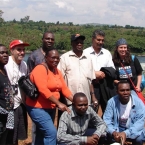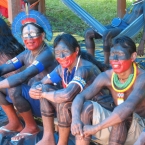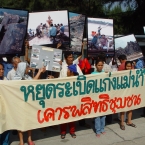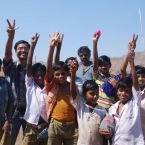The Movement for Rivers and Rights
Since our founding in 1985, International Rivers has always served to network and build the international movement of dam-affected people, social movements, NGOs and academics who work to stop destructive dams, protect rivers, defend community rights and advance truly sustainable solutions at the confluence of water and energy policy. Our regional and international networks have become one of the most effective and sustained civil society movements, representing the interests of the estimated 10% of humanity that has been directly impacted by dams.
This global movement has come together for three international meetings: the First International Meeting of People Affected by Dams, held in Curitiba, Brazil, in 1997; Rivers for Life: The Second International Meeting of Dam-Affected People and their Allies, held in Rasi Salai, Thailand, in November 2003; and Rivers for Life 3, held in Temacapulín, México in October 2010.
A film by International Rivers and Carla Pataky, shot on location at Rivers for Life 3 |
Rivers and watersheds seldom adhere to national boundaries. International Rivers organizes regionally with our partners around the globe, and over time we have developed a series of regional and national networks of dam-affected people and their allies. The following are just a few of the networks in which we take part:
Africa
The African Rivers Network (ARN) is a network of dam-affected peoples and NGOs working on river and dam issues on the continent. ARN's purpose is to promote solidarity among member groups; amplify participants' voices in important continent-wide discussions; and promote the recommendations of the World Commission on Dams (WCD), particularly for more participatory methods of dam planning. ARN's first meeting in 2003 began a pan-African civil society dialogue that illustrated the need for a grassroots river-issues network. They have since begun to tackle major regional river-development schemes that would have negative social and environmental effects and inequitable benefit-sharing. International Rivers is an active member of ARN.
Robert Kugonza, Coordinator of African Rivers Network (ARN), is based in Kampala, Uganda. He can be reached by email at robertk@nape.or.ug or rnkugonza@yahoo.com.
Latin America
International Rivers is a founding member of Redlar, the Latin American Network Against Dams and for Rivers, Communities and Water. Redlar is comprised of more than 250 indigenous, environmental, human rights and women’s organizations from 19 countries in Latin America. Redlar works to build alliances between groups and design strategies to confront the threats of hydropower development across Latin America. The network has held four regional meetings, the most recent one taking place in Colombia in July 2008. International Rivers also works with national and regional networks in México, Mesoamerica, Brazil, Chile, Ecuador and other parts of Latin America.
Southeast Asia-Mekong
In the Mekong region, civil society organizations, academics, and community movements from Burma, Cambodia, Thailand and Vietnam have built determined national coalitions committed to defending the region’s rivers. As widespread dam development threatens many rivers shared between countries, these groups also work together in regional coalitions and are joined by a wide network of global supporters. Recently-revived plans to dam the Mekong River's mainstream have been met with unified calls for the river to remain free-flowing. International Rivers works with groups throughout the Mekong region, supporting their efforts to protect its life-giving rivers.
South Asia
HYPHEN, the Himalayan and Peninsular Hydro-Ecological Network, was established in 2007 and aims to work on dam projects in Afghanistan, Bangladesh, Burma, Bhutan, China, India, Maldives, Nepal, Pakistan and Sri Lanka. Hyphen conducts research, training, litigation and campaigns for the conservation of Himalayan and Peninsular rivers, coasts, and wetlands, as well as addressing the problem of climate change by promoting community-managed eco-friendly development activities and livelihoods.
Hyphen is monitoring the West Seti, Upper Karnali and Arun III dam projects in Nepal and on the proposed Chalakudy River dams in India. The regional secretariat of Hyphen is based in Kathmandu, Nepal. Contact them at: secretariat@hyphenasia.org.
North America
Headquartered in Washington DC, American Rivers protects wild rivers, restores rivers damaged by dams and other hazards, and conserves clean water. Since it's inception in 1973, American Rivers has protected or restored more than 150,000 miles of rivers throughout the U.S. Their river conservation work focuses on ensuring clean drinking water supplies, revitalizing fish and wildlife, improving recreation, and leaving a legacy of healthy rivers for future generations.
China
In China, healthy rives are a national issue. China's national water pollution watchdog's, The Institute of Public & Environmental Affairs's Ma Jun has been a leading voice on efforts needed to protect China's rivers. Grassroots NGOs such as Green Watershed and Green Earth Volunteers, have long worked to draw attention to the dam rush on China's South-West rivers including Jinsha, Lancang and Nu Rivers. Chinese explorers such as Yang Yong from Hengduan Mountain Society to check the status of new dams and the health of headwaters, while national environmental groups such Shan Shui Conservation Center support community based environmental researchers in increase public information about the health of China's rivers.






